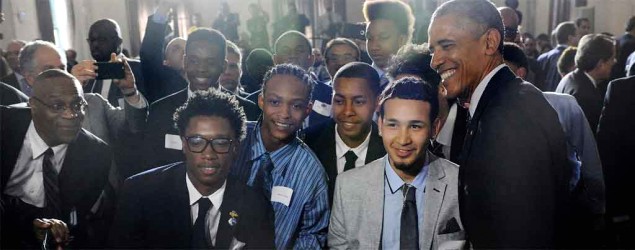Students
with President Obama at the launch of My Brother’s Keeper alliance at
Lehman College in the Bronx, N.Y., in May. (Susan Watts/The Daily News
via AP, Pool)
If you can’t appeal to their hearts, appeal to their pocketbooks.
That’s
what the president and his administration are doing to sell his My
Brother’s Keeper initiative, which seeks to help minority boys and young
men succeed at school and in the workforce.
In May, the president said the business and nonprofit leaders who support My Brother’s Keeper are “not doing this out of charity” or to assuage societal guilt.
“They’re
doing this because they know that making sure all of our young people
have the opportunity to succeed is an economic imperative,” Obama said.
Now the White House has released a report
highlighting the potential economic gains the country would sustain if
persistent educational gaps between boys of color and white boys were
closed, one of the key goals of My Brother’s Keeper. Minority men would
earn $170 billion more each year, the total U.S. gross domestic product
would spike by 1.8 percent and all American workers would see a 3.6
percent raise, the White House predicts. The more productive workers on
the job, the more the economy will grow, the report argues, and
investing in education for minority boys would be a fast way to get
there.
The
alternative is to allow more and more young men of color to continue to
drop out of the labor force, adding to a long list of what the New York Times has called “Missing Black Men.”
“For
every [minority man] who was born 25 years ago, only half of them are
employed today,” said Betsey Stevenson, a member of the president’s
Council of Economic Advisers who helped write the report. “That means
there are half of them we have lost — that’s a lot of talent we are
losing. When you think about it that way, it becomes obvious the toll
it’s taken on our nation.”
The
boys are lost to jail, early death and high unemployment, all societal
problems My Brother’s Keeper hopes to urge private businesses and local
governments to tackle. Though the president’s initiative has attracted
hundreds of millions of dollars in pledges, the daunting goal of closing
education and achievement gaps would take significantly more investment
to solve.
The president started My Brother’s Keeper last year, in part prompted by the death of teen Trayvon Martin,
who was shot by a neighborhood watchman in an Orlando suburb. Obama was
unusually vocal about Martin’s death, arguing that stereotypes about
minority boys and men being dangerous make them more likely to face
violence themselves. “Trayvon Martin could have been me 35 years ago,”
Obama told the press two years ago, recalling how he would hear car
doors locking as he walked down the streets. “We need to spend some time
in thinking about how do we bolster and reinforce our African-American
boys.”
The
president will make the goals of My Brother’s Keeper a major part of
his post-presidency. (“This will remain a mission for me and for
Michelle not just for the rest of my presidency but for the rest of my
life,” he said in May.) Private-sector leaders have formed an independent nonprofit, called the MBK Alliance, that will continue the work long after Obama leaves office.






No comments :
Post a Comment